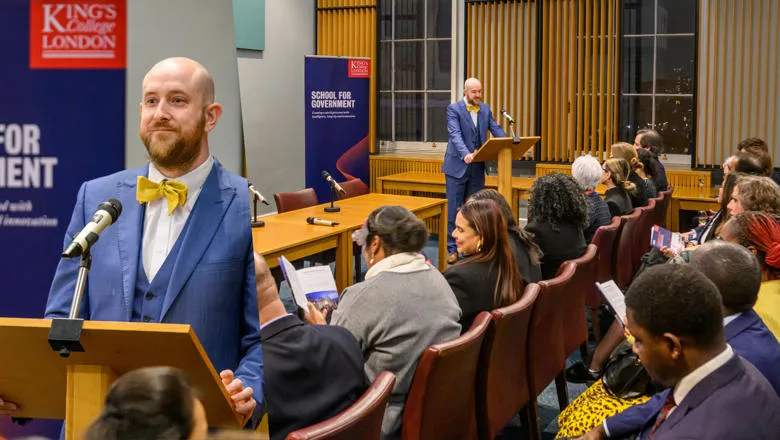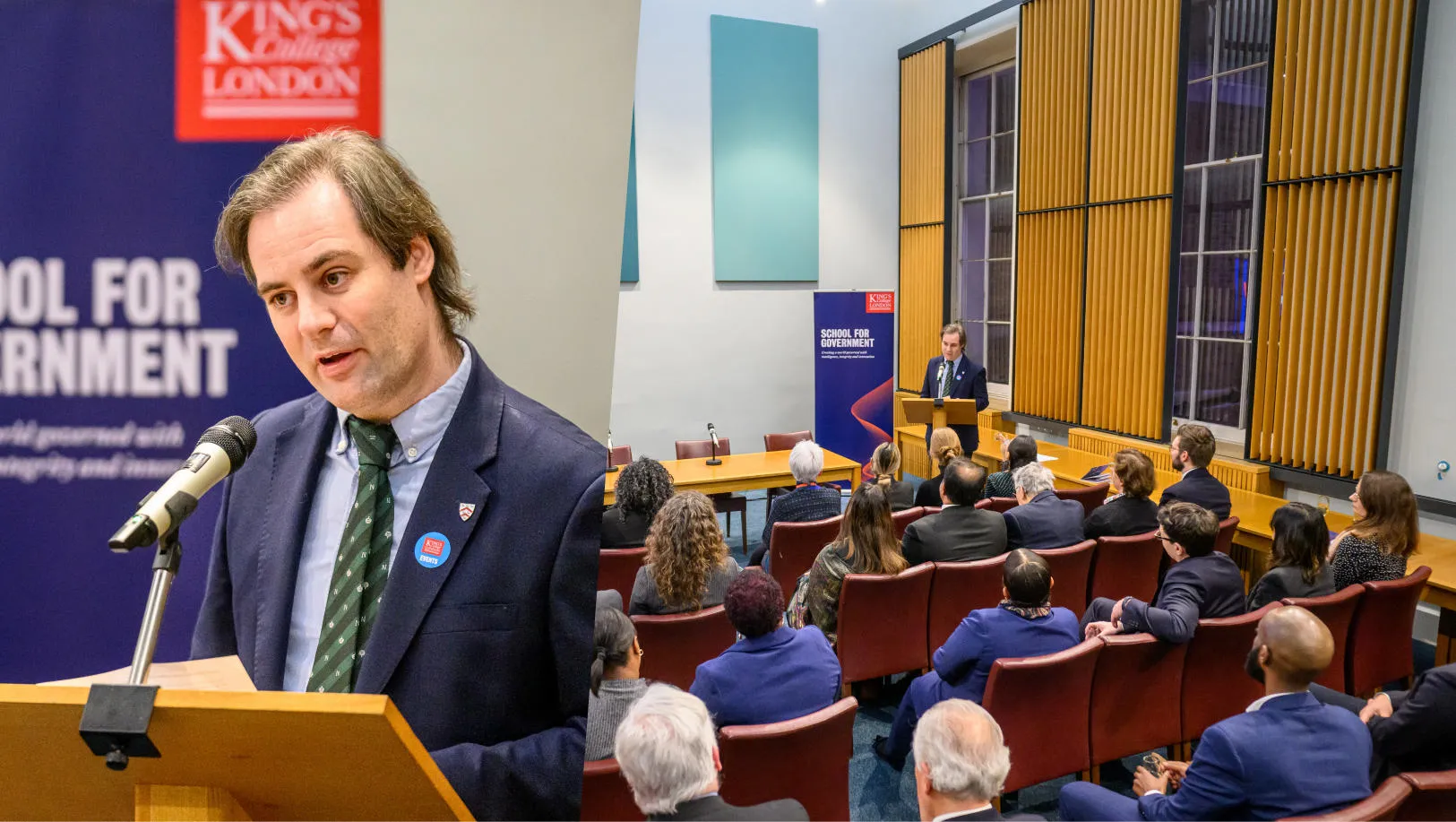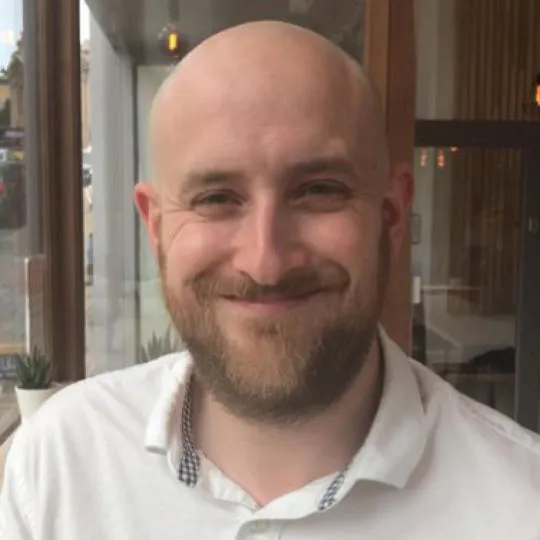19 February 2025
Strengthening public services and collaboration across the Commonwealth
The School for Government is delighted to be facilitating this through the Ben Delo Commonwealth Leadership Programme

Below is Professor Michael Sanders' speech from a recent event to mark the continuation of the School for Government’s scholarship programme. Aimed at mid-career civil servants of Commonwealth member states, the programme is kindly funded by British entrepreneur, mathematician and philanthropist Ben Delo.
Welcome to King’s College London, it’s fantastic to have you all here to be able to celebrate the launch of the second wave of our Ben Delo Commonwealth Leadership Programme. I’ll talk about the scholarships in a moment, but first I’d like to introduce our school.
The School for Government is a part of the Policy Institute at King’s College London and sits within the Faculty of Social Science and Public Policy. King’s is ranked 1st in the UK for public administration in the Shanghai University Rankings, and 1st for social policy in the Guardian University Guide.
The school has recently relaunched and rebranded, becoming the School of Government. This reflects us entering our second act, and our position within the broader institution. By bringing together expertise and talent from across the college; government; and society more broadly, we hope to contribute to a world led with intelligence, innovation and integrity.
Our Ben Delo Commonwealth Leadership Programme scholarships are available to public servants in commonwealth countries, British Overseas Territories and Hong Kong. This is our second round of scholarships. The first round funded 117 students from 20 countries, from Grenada and Singapore, Rwanda and Vanuatu. The scholarship allows students to take part in our five credit modules taught online by faculty here at King’s College London.

These postgraduate level modules take place over four weeks, with topics including:
- Public sector leadership
- Ethics, leadership and governance
- Learning what works
- International conflict analysis
- Behavioural insights
Our new module in artificial intelligence and public policy, launching imminently, showcases our ability to move with the times, and to present intellectually rigorous discussions about the future not just of government, but of humanity itself, in a reasoned and accessible way. This module in some ways exemplifies what we’re about here. It’s contemporary – rooted in what is happening right now, and it’s profoundly sensible. Governments are now caught between tech utopianists, who believe that AI will radically transform everything for the better, and doomsters who see Arnold Schwarzenegger strolling the streets by Christmas. Our module brings together both views, as well as people actually delivering these programmes in practice, in a variety of contexts, to give students the skills they need to credibly assess the debates.
Ben has been clear from the outset that he wants to support the Commonwealth, and with Hong Kong being added for this new round of scholarships, the importance of working with those nations with whom we have historic ties has been underlined once again.
The Commonwealth itself is a unique and powerful thing. This group of 56 countries was brought together based on shared history but is held together by what we share in the here and now. This is exemplified by Commonwealth nations continue to work together long after the end of Empire, and by the decision of countries with no ties to the British Empire to join the commonwealth.
Much can be made of the size of the Commonwealth – 2.7 billion people – the largest single grouping in the world. But I want to focus instead on the diversity of the commonwealth.
These 56 countries span every inhabited continent on Earth. Countries whose citizens are drawn from every creed. A place where nations of various faiths; and which embrace religious pluralism exist in concert with each-other and, crucially, with equality.
When I became Director of the School for Government, I said clearly that the foundation of our work would be equality, and diversity – two values that the commonwealth exemplifies. This diversity is important because it is morally right – because talent can come from anywhere and because an order that puts one person, or one group of people above others is wrong. It is also, more importantly, practically essential. If talent can come from anywhere, then a failure to elevate talent wherever it exists means we do not all benefit from the innovation; the genius, that they bring into the world. How many breakthroughs have we missed out on because the person who would have created it did not have access to the right resources to learn and thrive?
Diversity is also important to us at the school because we can learn from each other. Our students in the British civil service can learn from students around the world, and vice-versa. Every interaction with a colleague that has a different perspective, a different idea, makes us more likely to develop a solution to the challenges that plague us. These ideas can flow in all directions. My own research, which focuses on providing families with unconditional cash transfers to help improve their outcomes, is deeply inspired by work that began elsewhere in the commonwealth.
The Commonwealth’s mission is to work together for prosperity, democracy, and peace. These values could not be more important than they are today. The 56 countries of the commonwealth have all manner of governments and approaches to governing; but there are shared values at their core. These principles are as important now as they have ever been. Transparency and freedom lie at the heart of our shared values, in a situation where we are confronted with a world in greater turmoil, we must draw closer together. As Martin Luther King said, “The ultimate measure of a man is not where he stands in moments of comfort and convenience, but where he stands at times of challenge and controversy.”
This is a time for us to stand strong, and stand together, as a commonwealth with common values. I am grateful to Ben Delo for funding these scholarships, which allows King’s to be a part of strengthening public services and collaboration across the Commonwealth.

